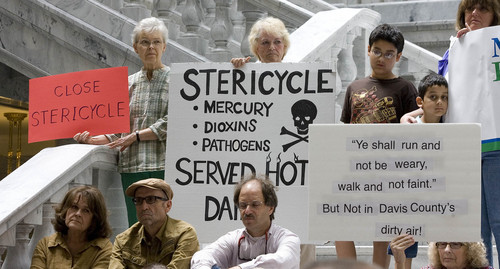This is an archived article that was published on sltrib.com in 2013, and information in the article may be outdated. It is provided only for personal research purposes and may not be reprinted.
Gov. Gary Herbert should move immediately to shut down the Stericycle medical waste incinerator in North Salt Lake. He should then expect the operators of that plant, one of the few such facilities left in the nation, to make the case for him to allow it to reopen.
Such a case would have to include a full accounting of all the times the plant has allowed excess amounts of toxic materials to escape into the atmosphere of what is now a largely residential area, and a point-by-point plan for how such failures will be avoided in the future.
If the facility's owners decide that making such a case, and making verifiable and enforceable promises that they are willing to stand by, is more than they are able to do — or more than they are willing to pay for — then the plant should remain permanently closed.
Stericycle's owners may have a legitimate beef against the local and state officials who allowed the company's activities to continue all these years at the same time that much of the surrounding land was rezoned for, and developed as, residential subdivisions.
But that is all water over the dam, and now a rare operation that makes its living by setting fire to medical waste shipped in from other states — states where such operations are illegal — is not at all suited to its surroundings.
Just how unsuited is not entirely clear, perhaps. But that lack of clarity is another reason why the operation needs to be shuttered, at least temporarily.
As was pointed out at a Capitol protest against Stericycle last week, neither state health officials nor Stericycle managers have done anything to measure the impact of the plant on its neighbors. Nobody is taking samples of blood or breast milk to determine whether the dioxins or other contaminants known to be present in medical wastes have worked their way into the local environment. Nobody in a position of authority locally really knows when, why or how often the plant has had to resort to "emergency bypasses" that allow ominous clouds of black smoke to rise from the plant, as occurred as recently as Sept. 6.
A recent statement from the governor's office expressed some concern, and some disappointment that, Stericycle apparently was not among the local industrial facilities that are voluntarily taking steps to clean up its act.
If nothing else, perhaps Stericycle's misbehavior will cure Herbert of the notion that voluntary cooperation with clean-air efforts have a chance of success.
What is necessary is laws. With teeth. Because nothing else will work.



